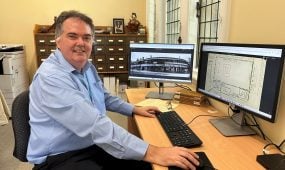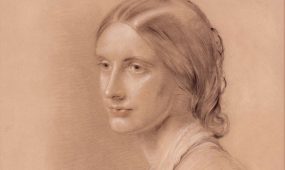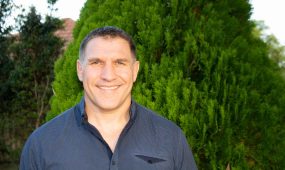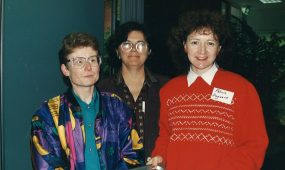Palestine: A land with a people
People & History
“Out of God’s sovereignty I believe that good will come out of all this. God knows what is going on and he will bring about a just peace and something good, even if we as human beings can’t see it yet; and, even though Palestinians have been waiting for a very long time,” says Anglican Palestinian Randa
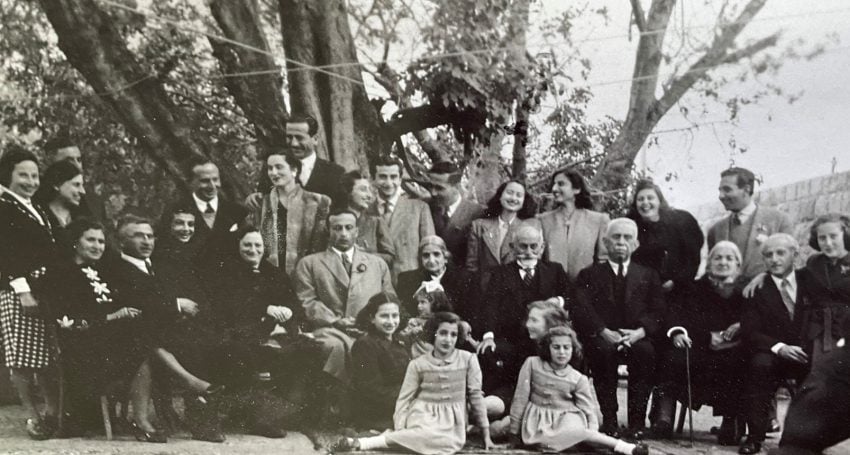
Please be aware that this account may be distressing for some readers.
It was December 1949. My family was waiting on the docks of Port Said in Egypt to embark on a journey as stateless refugees to Australia. We are Palestinian Anglicans who suddenly found ourselves stateless because our country of Palestine as we had always known it no longer existed. I was only eight years old at the time and from a very loving family, so I was yet to understand what had happened to my people and my country. It was night-time and the docks were floodlit and bustling as I waited with my father, mother, two sisters and brother. We boarded a migrant ship at Port Said, arriving in Australia about a month later.
We were a middle-class Palestinian family living in Jerusalem. We worshipped at a local Anglican church that no longer exists — when I last visited the church in the early 1990s it was shut and barricaded. My father was a businessman who managed a successful family-owned electrical retail shop. My mother was well educated. Both my parents spoke three languages — Arabic, English and French.
Residing in Jerusalem at the time, we lived peacefully under the British Mandate — Muslims, Christians, Jews and people of other faiths lived harmoniously together. My mother told me that the doctor who helped deliver me was Jewish. Our family had close Muslim friends. We were a multi-cultural, multi-faith and multi-lingual society living in peace. Indigenous Muslims, Christians, Jews and other Indigenous people of faith objected to the signing of the Balfour Declaration in 1917, which was about Great Britain pledging to establish “a national home for the Jewish people” in Palestine. This pledge led to the political Zionist movement’s goal of establishing a Jewish state in Palestine a reality. This 1917 pledge became a primary catalyst of Palestinians losing their homeland and identity in 1948 when the state of Israel was declared — the ramifications of which are still being endured to this day.
As a young girl, I remember the tank rolling down my street and a Zionist soldier in the turret announcing, on a cone-shaped loud hailer, “Leave or you will be shot”. At that point, I was unaware that whole Palestinian villages had been massacred.
Dozens of massacres occurred in the creation of Israel. One of the most well-known massacres was at Deir Yassin, a village on a hill near Jerusalem. More than 100 Palestinians were killed in this tragedy at the hands of Zionist militias. I have learnt that most of the people killed were women, children and the elderly — they were intentionally targeted while their men were at work.
As news of massacres like that at Deir Yassin spread, thousands of Palestinians began fleeing their villages. More than 700,000 Palestinians fled in terror or were displaced during Israel’s creation. The massacre at Deir Yassin was a horrifying turning point in Palestinian history because it put fear into the Indigenous Palestinian community.
I remember seeing the King David Hotel being blown up. It was blown up in 1946 by members of a Zionist terrorist group who posed as Arab workers to plant TNT and gelignite in the hotel basement. Over 90 people were killed, including civilians. Many British officers were based there because it was the British administrative headquarters. It was a strategic attack — the King David Hotel symbolised the British Mandate in Palestine. At the time, I was in a car that my mother was driving. I was seated in the front passenger seat and my sister was in a back seat. We were taking lunch to my father who was working in his shop near the Jaffa Gate, which is one of the open gates to the Old City of Jerusalem. We were stopped at barriers in front of the King David Hotel when suddenly there was a big, loud bang and the whole side of the building collapsed before us. We returned home immediately in shock. It is one of the clearest memories of my childhood. It has stayed with me until this day. I was only five years old at the time. I may be the last surviving eyewitness of the attack.
After the tanks rolled into our suburb in Jerusalem, my father decided it was safest for my mother, brother and me to join my two sisters who were living with my grandmother in Cairo while they were finishing their schooling. We expected our stay to be temporary in Cairo, planning to return once the school year finished. This was not to be. My mother tried to return home to Palestine — to Jerusalem — with us towards the end of 1948, but she was refused entry at the border and told, “This is now a Jewish state, and you are not a Jew. You are not welcome here.”
My father eventually joined us in Cairo in 1949. By then our family’s electrical retail shop and house had been possessed and occupied by Israelis. Our possessions were also stolen. There was no restitution. After coming to Australia, my father did everything he could to seek restitution — he wrote to many members of Parliament in Australia and in England and to Church leaders, but to no avail.
With the clothes on our back and a few suitcases, in December 1949 we left Port Said on a migrant ship for Australia via the Suez Canal, the Gulf of Aden and Colombo, surviving a typhoon. My father often said that he was “Like Abraham, going to a country he knew not where.”
After arriving in Australia my father borrowed money to buy a milk bar and grocery shop. He and my older sister joined the choir in the local Anglican church, where I attended Sunday school, enjoyed youth fellowship and was later married. My father also served as a Diocesan lay reader. He was ordained a deacon later in life.
“A land without a people for a people without a land” was first said by Chaim Weizman, who later became the first president of Israel. This phrase, associated with the Zionist political movement, is widely recognised as a myth, including by the United Nations. I show personal images of Palestinians on their land — a group photo of 50 or so family members at a gathering — and ask, “Does this look like a land with no people?”
Misunderstandings about Zionism and the state of Israel are a big part of the problem that Palestinian people face.
Judaism is a religion based on the Hebrew scriptures. Judaism is about knowing God and becoming holy.
However, Zionism is a nationalist movement — a political movement — started by Hungarian lawyer and political activist Theodor Herzl in the late 1800s. Zionism is not a religion. This becomes obvious when one understands that not all Jews (including not all Orthodox Jews) are Zionists and not all Zionists are Jews (there are Christian and atheist Zionists).
It needs to be understood that the modern state of Israel is not the same as the Biblical Israel. The conflation of the modern state of Israel with the biblical Israelites is an intentional mis-interpretation of the Old Testament.
Zionist Jews, Christians and atheists often contend that criticising both the modern state of Israel and Zionism is the same as criticising Judaism so that they can then claim the criticism to be “anti-semitic”. Many Christian leaders seem afraid to speak out publicly as a result, lest they are called “anti-semitic”. It is very disheartening that so many Australian Church leaders across different denominations are in effect complicit about the current genocide in Gaza through their silence or “fence sitting”.
Many Jewish people are horrified about what’s happening to Palestinian people in the Occupied Palestinian Territory (in both Gaza and the West Bank) and are bravely speaking out. More Christians need to speak out strongly for Palestinians — Christians are obligated as followers of Jesus to be compassionate to those who are suffering, and advocate for them.
I am against anti-semitism, as anyone I know is. However, I am not okay with anti-semitism being “weaponised” to crush conversations about Palestinian people and their very basic God-given rights to safety, freedom, peace and self-determination.
The mainstream media and many Australian politicians talk about the right of Israel to exist and defend itself even though Israel is the occupier — this was recently confirmed by the International Court of Justice determination, with a UN General Assembly resolution subsequently passed that obliges Israel to end its illegal occupation of Gaza and the West Bank within 12 months. Israel has rejected the resolution.
It’s important to speak and write about Palestine as a Palestinian. I am proud of my heritage and of the strength, faithfulness and resilience of my people — the Palestinians.
Out of God’s sovereignty I believe that good will come out of all this. God knows what is going on and he will bring about a just peace and something good, even if we as human beings can’t see it yet; and, even though Palestinians have been waiting for a very long time. A Palestinian friend living in the West Bank recently quoted Habakkuk 1 to me in an email: “O Lord, how long shall I cry for help…”
I’d like anglican focus readers to understand who Palestinians are and understand God’s justice in all of this and his love for all people. I ask anglican focus readers to understand the history of both Zionism and the Palestinian people, so they will show compassion and act.
ACSQ Justice Unit note: Here are three ways you can help Palestinian people in Gaza and the West Bank:
- As Advent starts, join in a “Gathering to Pray for Gaza and all Palestinians” peace prayer vigil with the theme “Palestine: a Land with a People”. The inter-faith vigil is co-hosted by the Anglican Church Southern Queensland and the United Nations Association of Australia Queensland Branch. See ACSQ Facebook and the anglican focus Events page for more information. This next inter-faith prayer vigil will be held between 6.45pm and 7.45pm on Saturday 30 November 2024 in Brisbane Square (at the top of Queen St). Thank you to the more than 80 recognised faith/community leaders who have helped lead “Praying for Gaza” inter-faith vigils in Brisbane since March.
- Contact your elected representatives asking for “an arms embargo and targeted sanctions” on Israel, in line with United Nations experts’ calls and in line with the Genocide Convention (which calls for member state signatories to actively “prevent genocide”).
- The Anglican-run Arab Ahli hospital in Gaza was bombed by Israel in October 2023, killing nearly 500 people. If you are able, please donate to the Anglican Board of Mission AID Gaza hospital emergency appeal.

